Key takeaways:
- Creative writing workshops foster a supportive environment that encourages vulnerability, creativity, and exploration of one’s craft through feedback and collaboration.
- Participants develop essential skills such as giving and receiving constructive feedback, improvisation, and networking, which can significantly enhance their writing journey.
- Personal growth is achieved by confronting insecurities, reflecting on experiences, and embracing authenticity, leading to deeper connections in writing.
- Maximizing workshop experiences involves preparation, taking notes, and being open to sharing work, which contributes to artistic evolution and stronger personal projects.
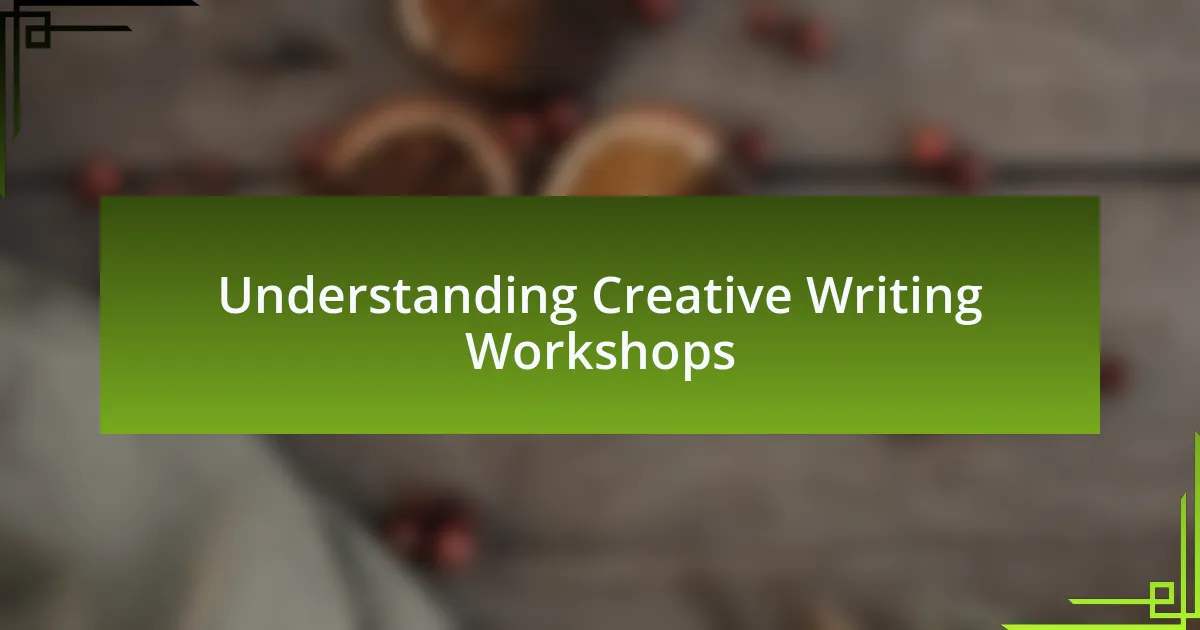
Understanding Creative Writing Workshops
Creative writing workshops offer a nurturing environment where writers, regardless of their skill level, can explore their craft. I remember my first workshop vividly—it was here that I learned the power of feedback from fellow writers. Have you ever shared your work only to receive unexpected encouragement? That’s the magic of these spaces.
In a workshop setting, participants don’t just write; they engage in discussions that ignite creativity and spark fresh ideas. I often found myself inspired by a stranger’s story, which made me reconsider my own writing approach. How often do we hold back our thoughts, waiting for the perfect moment to share? Workshops encourage us to embrace vulnerability.
These workshops also emphasize the importance of prompts and exercises, which can unlock new avenues in our writing. One exercise had us create characters based on everyday people, allowing me to see my neighbors in a completely new light. Isn’t it fascinating how a simple writing prompt can lead to profound revelations? Each session becomes a journey of self-discovery, unveiling layers of creativity within us that we might not have known existed.
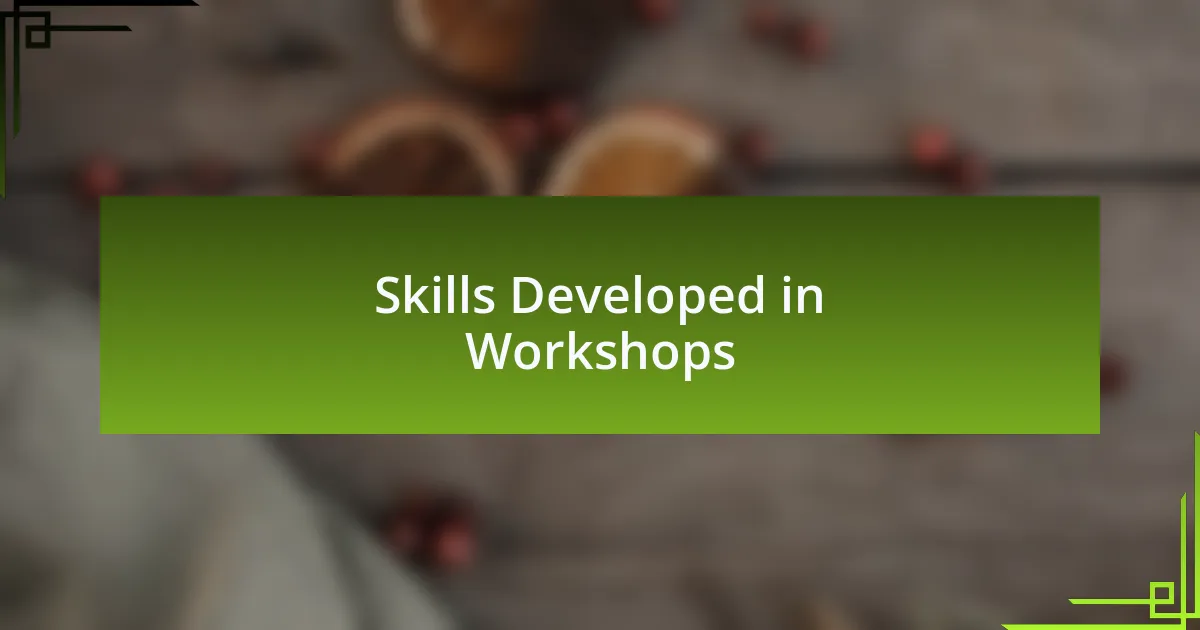
Skills Developed in Workshops
The collaborative spirit in workshops nurtures crucial skills, particularly the ability to give and receive constructive feedback. I distinctly recall a moment when a fellow writer pointed out a subplot I hadn’t realized was lacking depth. This kind of insight changed my perspective—have you ever had an “aha” moment in your writing? It’s transformative to see something through another’s eyes.
Another skill I honed was improvisation. During one session, we were challenged to write a short story in just 10 minutes based on a random word. The thrill of thinking on my feet made my creativity soar. I could hardly believe the twists my story took—I was surprised by my own imagination. Isn’t it empowering to discover new facets of your creativity when pushed outside your comfort zone?
Networking with other writers is another invaluable aspect of workshops. I remember bonding with someone over our shared struggles with character development, which not only fostered camaraderie but also enriched my understanding of the craft. How often do we overlook the power of community in enhancing our skills? These connections can lead to lifelong friendships and collaborations that significantly enrich our writing journeys.
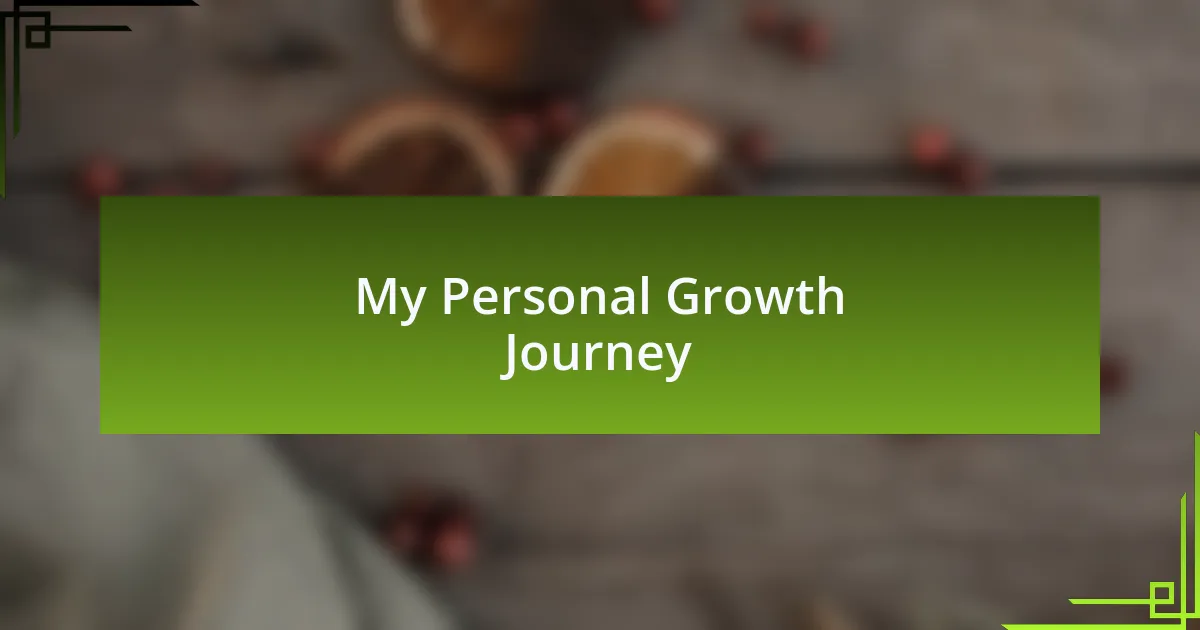
My Personal Growth Journey
The journey of personal growth I experienced through creative writing workshops was nothing short of profound. One evening, as we shared our pieces around the room, I felt a surge of vulnerability. It was daunting to open up my work to critique, yet the supportive atmosphere made me realize the power of honesty in writing—have you ever felt the freedom that comes with sharing your authentic self? That night, I learned that vulnerability isn’t a weakness; it’s the very catalyst of creative growth.
As I immersed myself in these workshops, I also discovered how to navigate through my insecurities as a writer. I vividly recall a particularly nerve-wracking moment when I hesitated to share a poem I had poured my heart into. When I finally did, the encouraging feedback from my peers sent a wave of relief over me. This experience taught me that stepping outside my comfort zone can lead to unexpected validation and strength. Doesn’t it feel exhilarating to break free from self-doubt and embrace one’s own voice?
Moreover, I began to recognize the importance of reflection in my writing process. Each workshop encouraged me to delve deeper into my motivations and experiences, allowing me to draw richer inspiration from my life. One day, while revisiting a piece about a childhood memory, I was struck by how much I had changed and grown as a person. Doesn’t reflecting on our past help us connect more meaningfully with our present? Embracing this journey not only enriched my writing but also deepened my understanding of who I am as an artist.
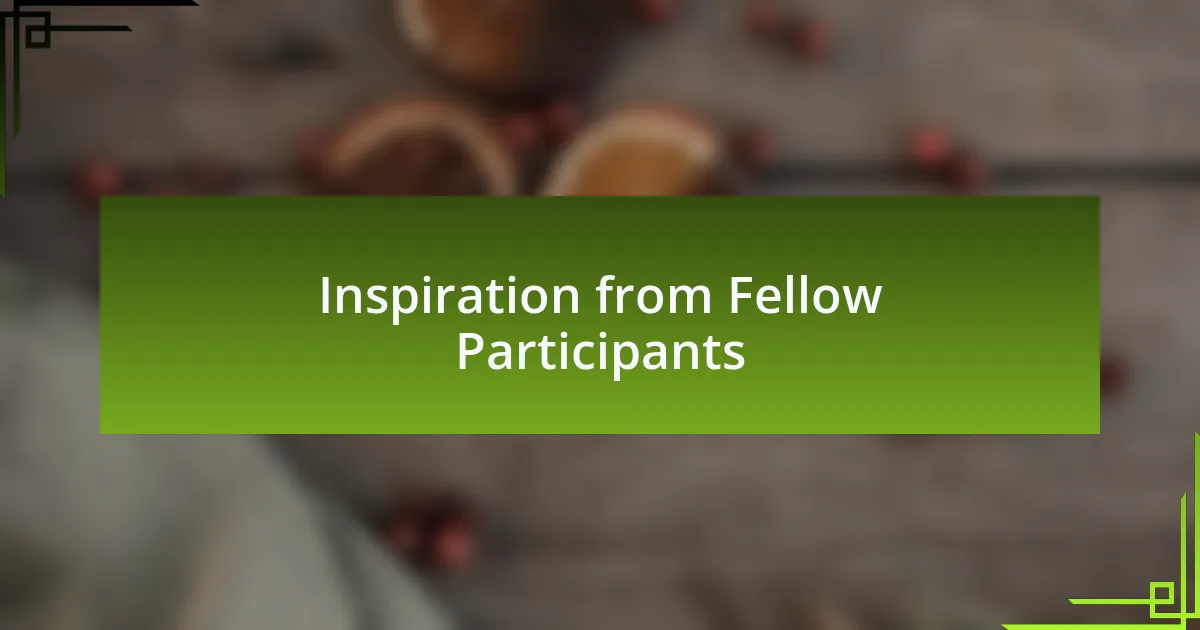
Inspiration from Fellow Participants
In one workshop, I found myself captivated by a participant who shared her story about overcoming adversity. Her words struck a chord with me, sparking an idea for a piece I never thought I could write. Have you ever been so inspired by someone else’s experience that it ignited a fire within you? Listening to her made me realize how powerful storytelling can be—it connects us and transforms our own narratives.
As I listened to my fellow writers, I began to appreciate the diverse perspectives we all brought to the table. One evening, a participant shared a haunting piece about loss that resonated deeply with my own struggles. It struck me how each person’s story, woven together, created a tapestry of shared experiences. Isn’t it incredible how, through our differences, we often find common ground? That moment helped me understand the value of community in igniting our creativity.
I also recall a lighthearted moment during one session when a fellow participant boldly read a quirky, comedic piece that had everyone laughing. This reminded me that creativity doesn’t always have to be serious or profound; sometimes, it thrives in humor and spontaneity. How often do we get too serious about our craft? This experience taught me that embracing fun in writing can fuel imagination and bring joy to the creative process.
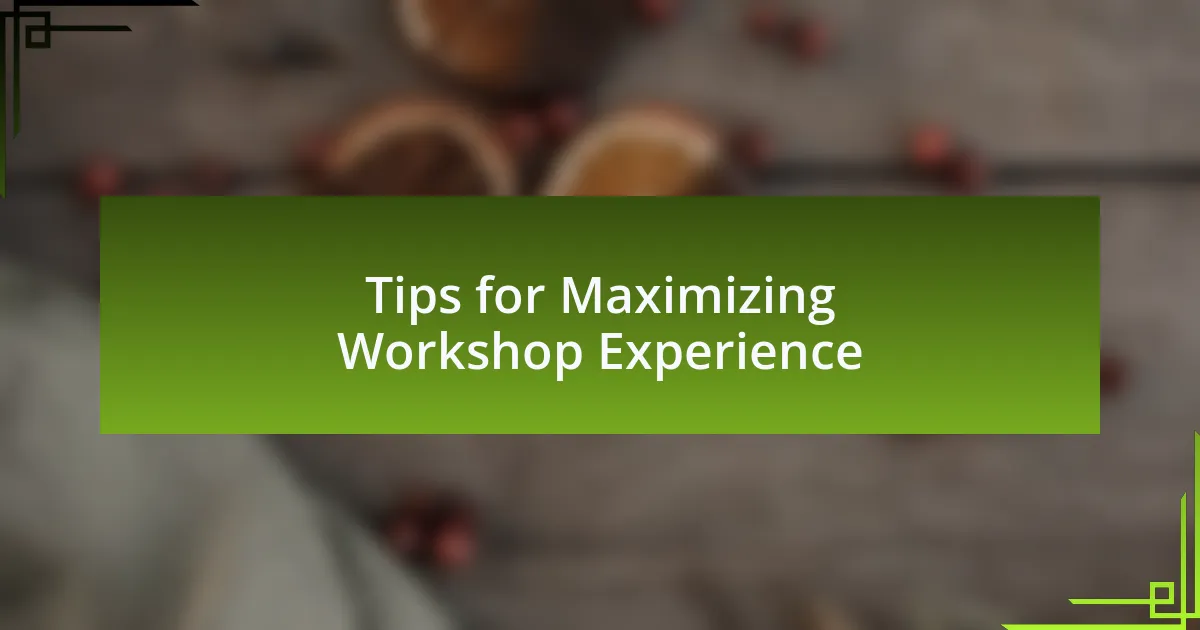
Tips for Maximizing Workshop Experience
To make the most of your workshop experience, come prepared with questions. I remember attending a session where I was hesitant to share my thoughts, but once I started asking questions, the floodgates opened. Connecting directly with the facilitator not only clarified my uncertainties but also enriched my learning. How often do we miss out on valuable insights simply because we hold back?
Another crucial tip is to take notes liberally. In one workshop, I filled an entire notebook with ideas and feedback. Each page became a treasure trove of inspiration that I still refer back to. I believe that jotting down even the smallest details can create a powerful resource for your future writing. Have you ever revisited notes and found a hidden gem that could transform your work?
Lastly, don’t shy away from sharing your work—it’s a chance to grow. In one session, I hesitated but eventually shared a rough draft that I thought was far from polished. The supportive critiques I received were eye-opening and gave me clarity on my direction, reinforcing the idea that vulnerability can lead to deeper connections. So, how can you embrace this challenge in your own writing journey? Engaging with feedback truly paved the way for my creative evolution.
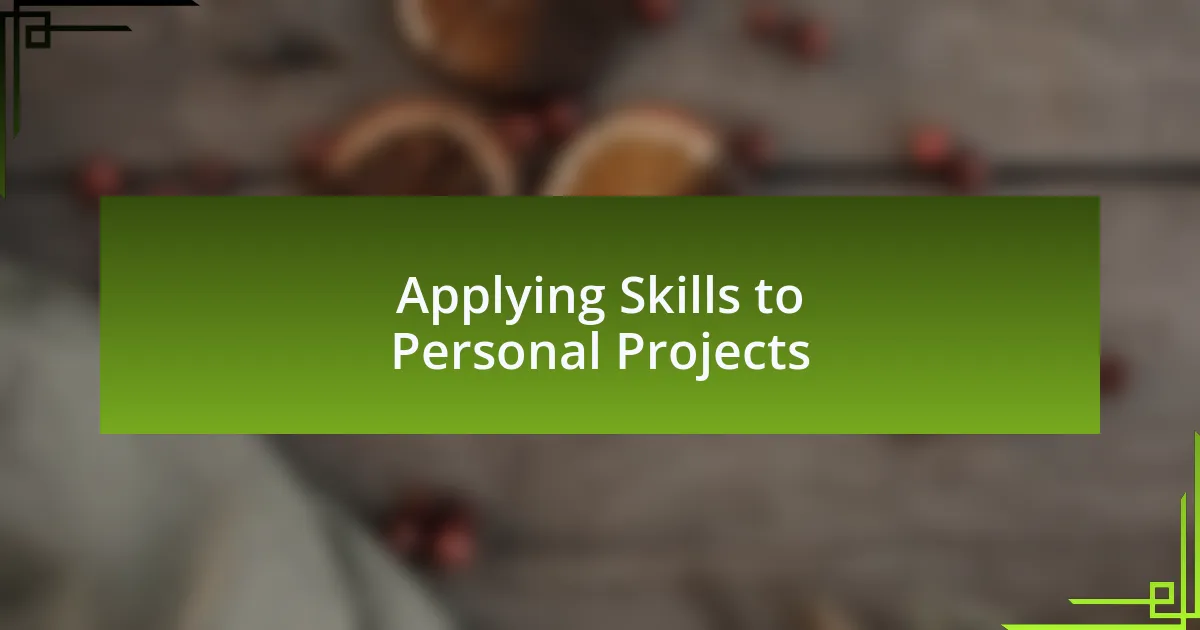
Applying Skills to Personal Projects
After attending creative writing workshops, I’ve found my personal projects have flourished in unexpected ways. I remember working on a short story about my grandmother’s life; the techniques I learned during the workshops helped me structure my narrative better. Suddenly, I could weave in flashbacks and character development more effectively, transforming a simple retelling into a vivid exploration of her experiences. Have you ever felt your writing take flight after picking up a new technique?
One of the most impactful skills was learning to embrace my unique voice. I once struggled to find the right tone for a blog post I was working on. After experimenting with style exercises during a workshop, I felt liberated to write authentically. This shift not only made my content more engaging but also brought a genuine connection with my readers. Isn’t it amazing how stripping away the fear of judgment can unleash your creativity?
As I applied these skills to my personal projects, I also discovered the importance of setting specific goals. For instance, after one workshop, I committed to finishing a poem each week. Holding myself accountable transformed my writing practice from a casual hobby into a true passion. What goals could you set to enhance your creative journey? Sometimes, a little structure can ignite the vibrant chaos of inspiration.